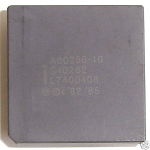Difference between revisions of "Intel 80286"
(New page: The i286 was the second generation 8088/8086 cpu. The 286 was noted for being more efficent then the prior parts, so at the same clock speed it was slightly faster. The 286 also introduc...) |
|||
| Line 1: | Line 1: | ||
| + | [[Image:I80286.jpg|thumb|right|150px|i80286]] | ||
The i286 was the second generation 8088/8086 cpu. The 286 was noted for being more efficent then the prior parts, so at the same clock speed it was slightly faster. | The i286 was the second generation 8088/8086 cpu. The 286 was noted for being more efficent then the prior parts, so at the same clock speed it was slightly faster. | ||
Revision as of 15:37, 26 September 2009
The i286 was the second generation 8088/8086 cpu. The 286 was noted for being more efficent then the prior parts, so at the same clock speed it was slightly faster.
The 286 also introduced protected mode. In this mode, it had a 24bit address bus to allow acces for up to 16MB of ram, and a virtual address space of 1GB.
There was however two major flaws with the 286 cpu. The first being that all the memory was divided in 64kb segments. With the ever growing popularity of the m68k cpu's with flat address space this was a major problem as it hampered the design & porting of large programs. Also the 286 had no method of switching the CPU from protected mode to real mode.
It was Gordon Letwin of Microsoft that found a way using a 'tripple fault' to soft reset the 286 into real mode, however it could take nearly 1 second, making switching from protected to real not fesable to be done often.
The 286 was seen by the software business as being a rather disapointing CPU. Intel listened, and it's next chip the i386 corrected all the issues people had with the 286.
